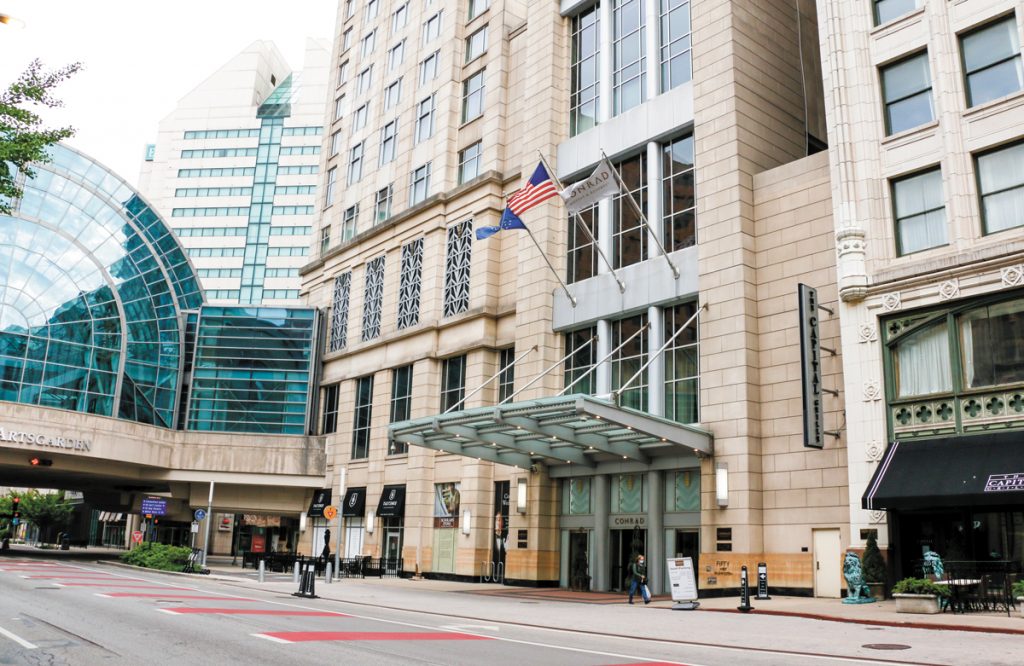Subscriber Benefit
As a subscriber you can listen to articles at work, in the car, or while you work out. Subscribe NowContinuing a national trend, a downtown Indianapolis hotel that suffered significant blows as a result of the COVID-19 pandemic did not prevail before the 7th Circuit Court of Appeals in its attempts to secure insurance coverage for its pandemic-related losses.
In 2020, occupancy rates at the Conrad Indianapolis, 50 W. Washington St., dropped “into the single digits” due to the COVID-19 pandemic. The hotel “lost virtually all of its business income” while incurring “additional expenses for cleaning and disinfecting the property.”
At one point, just six of the hotel’s 247 rooms were occupied, and the hotel suspended all operations in April 2020.
Circle Block Partners LLC and Circle Block Hotel LLC, which own and operate the Conrad, had purchased a commercial property insurance policy from Fireman’s Fund Insurance Company to cover the property. When the insurer denied Circle Block’s claims for losses, the owners initially sued in Indiana state court, alleging breach of contract and seeking a declaratory judgment of coverage under the policy.
Once the case was removed to the U.S. District Court for the Southern District of Indiana, Judge James P. Hanlon granted Fireman’s Fund’s motion to dismiss, denying as moot Circle Block’s motions for oral argument and to compel.
The 7th Circuit affirmed in Circle Block Partners, LLC and Circle Block Hotel, LLC v. Fireman’s Fund Insurance Company, 21-2459, citing the Indiana Supreme Court’s recent denial of transfer in a similar case involving the Indiana Repertory Theatre.
Court of Appeals of Indiana judges had previously ruled in the state-court case that the IRT could not claim loss-of-use coverage due to COVID under its insurance policy because the theater was not physically damaged when it could not use the property to host live performances.
The 7th Circuit determined the Conrad was in a similar boat: The business, although forced to shut down or reduce operations during the pandemic, failed to allege “direct physical loss” or “direct physical damage” to property.
“We recognize that Circle Block was not able to use the Conrad property as it would have preferred. But as Indiana Repertory Theatre and the overwhelming majority of similar cases under other states’ law have held, a temporary denial of a plaintiff’s preferred use of its property, absent some physical alteration, does not fall within the plain meaning of ‘direct physical loss or damage,’” Circuit Judge David Hamilton wrote.
The appellate panel added that because of the Conrad’s status as an essential business for certain purposes, it was permitted to remain open to provide lodging and delivery or carryout food services. Essentially, it concluded the hotel was not rendered “completely uninhabitable by the pandemic.”
The 7th Circuit pointed to the period-of-restoration policy language to reinforce its conclusion. It found problems with the hotel’s argument—supported by amicus Purdue University—that virus particles physically attached to surfaces at the Conrad, “adsorbing” onto surfaces in the building and materially altering them.
Further, the court noted that neither Sandy Point Dental, P.C. v. Cincinnati Insurance Co., 20 F.4th 327 (7th Cir. 2021), nor Indiana Repertory Theatrehold that any imaginable physical alteration is sufficient. Also, adopting Circle Block’s argument would require the court to “carve out a narrow sliver of circumstances in which a business’s COVID-19 insurance claim may proceed.”
“At oral argument, Circle Block acknowledged that its position would effectively be limited to hotels in Indiana, based on both length of exposure and the types of surfaces present in hotels,” Hamilton wrote. “But many other businesses where employees and patrons may be subject to prolonged exposure—dental offices or restaurants or childcare centers—have draperies, carpeting, and other surfaces like the ones Circle Block identifies.
“For that matter,” he continued, “we have also rejected other hotels’ COVID-19 coverage claims. … We see no principled distinction for holding that Circle Block can succeed where those plaintiffs did not.”
Turning to Circle Block’s “broad definition” of “direct physical damage,” the 7th Circuit said such an understanding would extend coverage to any situation where “material matter” is added to a surface.
“A sneeze that spreads cold virus particles, for example, would be deemed to have inflicted ‘direct physical damage,’” Hamilton concluded. “We have a hard time imagining that a reasonably intelligent policyholder would share such an expansive understanding of that phrase. Nor does Circle Block explain how this addition of ‘material matter’ would ‘require restoration or relocation.’”
Finally, the appellate panel found that the district court did not err by dismissing the case without leave to amend the complaint. It also concluded that the certification of two questions of state law to the Indiana Supreme Court was not warranted.
Those questions included:
- Does the undefined insurance policy term “direct physical loss or damage” require tangible, visible physical alteration or destruction of property under Indiana law?
- Does the persistent attachment of invisible—yet physical, dangerous and harmful—particles to property constitute “direct physical loss or damage” under Indiana law?
“These issues are undoubtedly important to policyholders and insurers, but the Indiana Supreme Court will have opportunities to address them in cases proceeding through the state courts,” the appellate court concluded. “The Indiana Supreme Court recently decided not to address those issues when it denied transfer in Indiana Repertory Theatre. … This is not a case where certification ‘may be the only way to allow the state courts to resolve an issue of state law.’”
Please enable JavaScript to view this content.


Good.